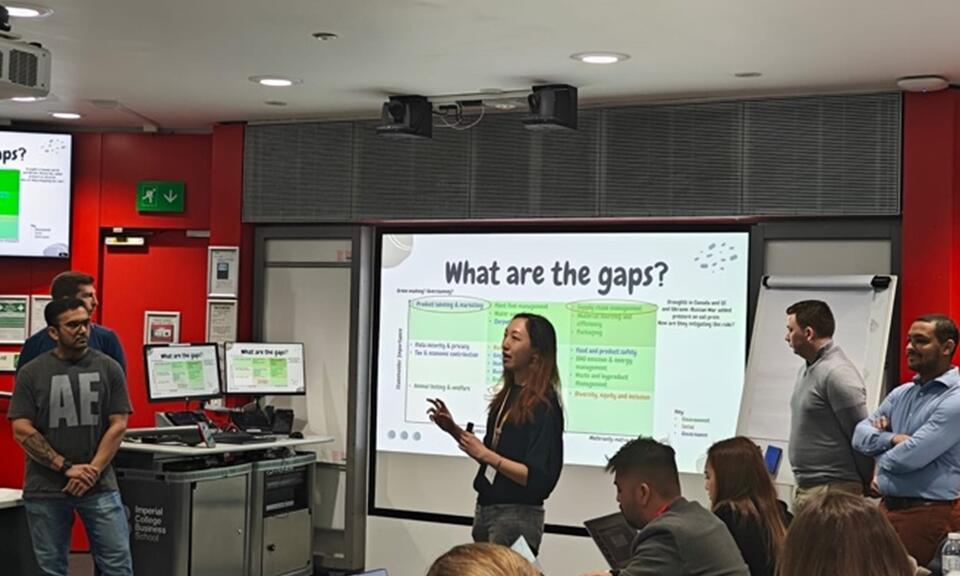What I've learned studying Imperial's Full-Time MBA
Eva Look, a Full-Time MBA student, offers insights into her learning journey thus far. She delves into her module selections, explaining the rationale behind each choice and highlighting the significant lessons and takeaways from each module. Through her reflections, she provides a glimpse into the classroom experience integral to this programme.
About me
Prior to joining the programme, I worked in advertising agencies for six years in Hong Kong, providing marketing consultations and executing advertising campaigns.
My goal after graduation is to work in social impact and sustainability consulting roles, where I can utilise my expertise in a more impactful sector. I chose to study at Imperial Business School because of its reputation and its comprehensive and up-to-date programmes. For example, I am able to learn more about Artificial Intelligence (AI) in different modules, which may not be available at other schools yet. Let me share insights into the modules I've chosen for this term at Imperial!
My first impressions of Imperial Business School
In terms of the MBA students and alumni I have encountered so far, my first impression was overwhelmingly positive.
The MBA cohort is not only culturally diverse but also incredibly friendly. We bonded closely during the two weeks before the start of the school year, engaging in team-building activities and treating each other as family members.
The support and love from the alumni community are also remarkable. Many alumni return to the business school to share their MBA journey and work experiences, and my mentor went the extra mile to welcome me to Imperial and give me a tour of the campus, which was heart-warming.
The modules I’ve chosen and why
This term, I've enrolled in six modules, including two compulsory ones: Marketing Management and Business Problem Solving. Additionally, I've opted for Design Thinking, Sustainability and Competitive Advantage, Data Analytics and Visualisation for Business, and Managing Negotiations as my elective modules. Let's dive deeper into a couple of these courses to provide a glimpse of my learning experience:
Data Analytics and Visualisation for Business
In this module, Professor Xiaocheng Li provided us an overview of various methods for handling, analysing, and visualising data. We acquired basic knowledge of tools such as Python, SQL, and Tableau. We also explored the application of AI tools in data analysis and gained an understanding of their strengths and limitations. An interesting fact we discovered was that if we ask GPT4 to perform calculations without using Python code, it fails to provide accurate answers. Throughout the programme, we had the opportunity to work on assignments using real-life data, where we tried building predictive models to solve business problems.
Design Thinking: Solving Complex Problems Through a Disruptive Mindset
In this module, we embarked on a 2.5-month journey exploring the design thinking methodology and process with Professor Ileana Stigliani. We began by defining the problem and conducting user research, followed by collecting and clustering inputs to gain key insights. Using these insights, we engaged in an idea generation process to generate numerous ideas, and then selected a few for testing and feedback. At the end of the module, we were required to present our process and final product to a panel consisting of professionals from creative agency. Throughout the journey, we were provided with tools and frameworks to guide us at every step. Our team focused on the challenge of helping students land jobs more effectively, which involved interviewing students, career consultants, and recruiters to understand their pain points. We then developed prototypes to test and refine our ideas, and finally proposing a AI-powered platform that consolidate various tools and platform together as a final product. It was a comprehensive and enriching experience that allowed us to apply design thinking principles in a practical context.
Business Problem Solving
In this module, Dr. Ian Mackenzie provided us with valuable insights into business problem solving and consulting. With his extensive practical experience, he presented us with various real-life business cases, guiding us on how to break down and address complex problems. These cases included topics such as organisational restructuring, innovation transformation, and even effective interview techniques. The sessions were highly interactive with active participation from our cohort, allowing us to learn from one another and gain different perspectives on how to approach the cases. To conclude the module, we will be working in groups to write a proposal based on a case study, applying the knowledge and skills we acquired throughout the sessions.
My favourite memory of the programme so far
While working with my classmates on various school projects and perfecting our group presentations has been a rewarding experience, my best memory as an MBA student thus far is the getaway we had with my cohort in October. We embarked on a hike to Sevens Sisters Cliff, and it was an incredible bonding experience. The hike presented its challenges, but we supported and encouraged each other throughout the journey, allowing us to enjoy the breathtaking views of the cliffs along the way.
My advice to candidates considering applying to Imperial Business School
Be authentic both to yourself and to the admissions panel. Take the time to deeply understand yourself and your long-term career aspirations. This self-reflection will help you craft a compelling narrative that genuinely conveys your story to the admissions panel.
Additionally, reach out to current students at the Business School to gain insights into what Imperial Business School offers and determine if it aligns with your goals. Student ambassadors are available to answer your questions and provide guidance to fine-tune your application to the programme.






